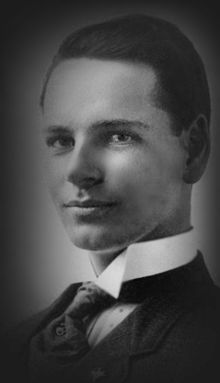Herbert J. Krapp
Herbert J. Krapp | |
|---|---|
 | |
| Born | 1887 |
| Died | 1973 |
| Nationality | USA |
| Known for | Theatre architect |
Herbert J. Krapp (1887, New York City, - 1973, Florida) was a theatre architect and designer in the early part of the twentieth century.
Krapp was an apprentice with the Herts & Tallant firm, where he was involved with designing the plans for the Lyceum, Shubert, Booth, New Amsterdam and Longacre Theatres, among others. He departed the firm in 1915. Between 1912 and 1916 Krapp began working directly with the Shubert brothers; eventually he would become their primary architect. He also designed theatres for the Chanin brothers.
Krapp was well known for his ability to use his building space to its fullest potential. For the Majestic Theatre, Krapp incorporated stadium seating into the plans for the orchestra level, creating better sightlines and allowing for the creation of larger lounge and lobby areas. He designed the Ambassador Theatre on a completely diagonal plan to fit it into a small space. Krapp was responsible for completely renovating the Winter Garden Theatre and the Helen Hayes Theatre in the 1920s. He also designed the Hotel Edison, the Lincoln Hotel (now the Row NYC Hotel), and numerous other buildings.
Although the stock market crash of 1929 brought an end to the theatre building boom, Krapp remained with the Shuberts until 1963, supervising the maintenance and renovations of the existing venues. He also experimented with inventing; one of the tools he created was patented and used by the U.S. Air Force. He died in Florida in 1973.
Buildings designed by Krapp
Column-generating template families
The templates listed here are not interchangeable. For example, using {{col-float}} with {{col-end}} instead of {{col-float-end}} would leave a <div>...</div> open, potentially harming any subsequent formatting.
| Type | Family | Handles wiki
table code?† |
Responsive/ mobile suited |
Start template | Column divider | End template |
|---|---|---|---|---|---|---|
| Float | "col-float" | Yes | Yes | {{col-float}} | {{col-float-break}} | {{col-float-end}} |
| "columns-start" | Yes | Yes | {{columns-start}} | {{column}} | {{columns-end}} | |
| Columns | "div col" | Yes | Yes | {{div col}} | – | {{div col end}} |
| "columns-list" | No | Yes | {{columns-list}} (wraps div col) | – | – | |
| Flexbox | "flex columns" | No | Yes | {{flex columns}} | – | – |
| Table | "col" | Yes | No | {{col-begin}}, {{col-begin-fixed}} or {{col-begin-small}} |
{{col-break}} or {{col-2}} .. {{col-5}} |
{{col-end}} |
† Can template handle the basic wiki markup {| | || |- |} used to create tables? If not, special templates that produce these elements (such as {{(!}}, {{!}}, {{!!}}, {{!-}}, {{!)}})—or HTML tags (<table>...</table>, <tr>...</tr>, etc.)—need to be used instead.
References
External links and resources
- Short history
- Partial listing of theatre credits at Cinema Treasures
- Broadway Theatres: History and Architecture, William Morrison, 1999, Dover Publications, ISBN 0-486-40244-4
- Lost Broadway Theatres, Nicholas Van Hoogstraten, Princeton Architectural Press, 1997, ISBN 1-56898-116-3
- The Shuberts Present: 100 Years of American Theater, Maryann Chach, Reagan Fletcher, Mark Evan Swartz, Sylvia Wang, Harry N. Abrams, 2001, ISBN 0-8109-0614-7
- Shubert Organization Theatres [1]
